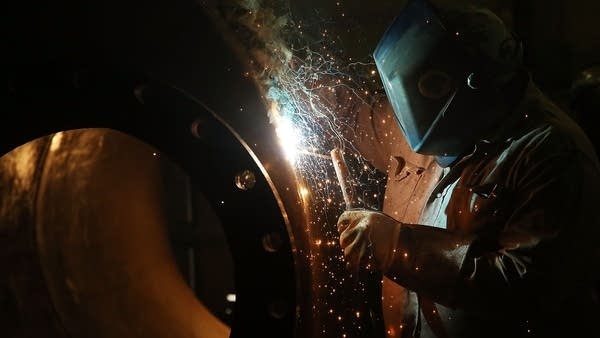Efforts to boost manufacturing and clean energy run up against a shortage of welders
Welders are needed to build and upgrade roads and bridges, energy infrastructure and chip foundries. But the profession has an image problem.

One industry that did a lot more hiring in March, according to the Labor Department, was construction. Employers added 39,000 jobs — about twice the monthly average over the past year. Meanwhile, the Labor Department said this week that the number of unfilled construction jobs at the end of February was near a record high.
A surge in federal funding for infrastructure projects, chip factories and clean energy production is boosting demand for workers to build those projects. That surge is highlighting a shortage of skilled workers — especially welders.
The Southern California Welding Training & Testing Center in Oxnard is a fairly large industrial space, with a roll-up door in the back and 20 welding workstations lined up along the walls. When I visited recently, about 20 students were working on various types of projects, using various welding methods.
“Some of them are arc welding,” said Jesse Guzman, the training center’s founder and chief academic officer. “We’ve got all different welding processes going on at once.”
Guzman said some of the students are straight out of high school. Others are looking for a career change.
“People that work in food service industries, barbers, people that work in different building trades, they wind up seeking welding because they’re looking at something more rewarding,” Guzman said.
A big reason that it’s more rewarding? The money.
That helped Nicholas Min, 28, decide to enroll in the training program. Min spent a few years in the Marine Corps as an aviation mechanic. After he left the Marines in 2019, he worked in marketing, website development and other online work, he said. But the pay wasn’t great, and the jobs were inconsistent.
But a welding career, said Min, would be a lot more lucrative. “I could work at a union, whether it’s the pipefitter union or sheet metal union or ironworker union,” he said. “A whole bunch of those unions pay $50 an hour, $50-plus an hour.”
Min said that kind of income would make a huge difference for his family. “Being debt-free, not living paycheck to paycheck, making sure you’ve got rent paid for, is definitely a big burden lifted off your shoulder.”
Manufacturers and others are pushing that message: Welding is a rewarding and lucrative career. In part, it’s a response to the profession’s image problem.
“There’s a perception of a dark, a dirty, a dangerous, dead-end career,” said Monica Pfarr, executive director of the American Welding Society Foundation.
Pfarr said changing the public’s perception is important. That’s because ever since the mid-2000s, a lot of welders have been retiring.
The American Welding Society keeps track of the national shortage of welders, which Pfarr said is growing.
“Our last numbers were 300,000 welders needed over the next four years,” Pfarr said. “And now, it’s at 330,000.”
While the supply of welders is going down, demand for them is exploding. The Infrastructure Investment and Jobs Act, the CHIPS and Science Act and the government’s clean energy efforts rely on welders to build and upgrade roads and bridges, energy infrastructure and semiconductor foundries.
And then, there’s defense contracting.
“We’re also in fierce competition for that same labor pool,” said Whitney Jones, director of the Navy’s Submarine Industrial Base.
Jones said the Navy’s hoping to ramp up submarine production fivefold by 2028. And welders, she said, are fundamental to the Navy’s success.
“If we don’t have the people to make ships and submarines, to sustain and modernize those ships and submarines, it doesn’t really matter what else we have,” Jones said.
Jones said the Navy is making sure training programs know what kind of welding skills it’s looking for. But even the best classroom training can’t teach some of the skills welders need.
“That’s where we have to do a lot of on-the-job training,” said Chris Blench, the owner of Mavericks Manufacturing Partners, a company in Escondido, California, that does advanced welding and metal fabrication for the aerospace and defense industries.
The company has been around for about a year, and Blench is still lining up contracts. He’s also lining up welders.
“Because once the work starts hitting, everybody wants it now,” said Blench. “And so we can’t take six months to bring on the team and train them. So we need to be ready.”
In Oxnard, California, Nicholas Min, the welding student, said a better-paying job isn’t the only reason he’s excited to be a welder. He’s a big car guy. Right now, he’s customizing a 1995 Toyota Supra. And as a welder, he’ll be able to build up any car he wants to.
“Call my friends over, build their cars, go to the track, wreck it, build it again,” Min said. “I mean, it’s great.”
Min said welding car parts in his spare time will let him bring in even more money to support both his family and his hobby.




